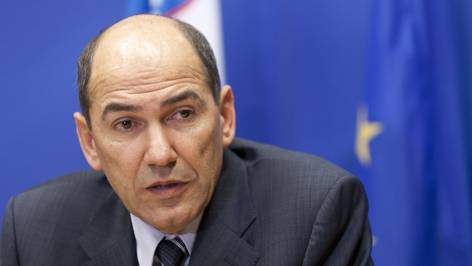NEWS
Prime Minister's statement on European Council meeting
The Prime Minister of the Republic of Slovenia, Janez Janša, delivered a media statement after the European Council meeting stating that Slovenia has been facing a phase delay in addressing and exiting the crisis, as shown by comparisons between EU member states on the implementation of fiscal consolidation and economic reforms. He particularly emphasised that the country's financial consolidation has been lagging behind. He expressed his regret over Slovenia's slip down several rankings – before the crisis, it consistently featured in the top half – its fall into the lower half, and its considerably weakened strategic position.
The Prime Minister said that it would be vital for Slovenia to balance this year's expenditure and revenue and that, while implementing fiscal consolidation, measures for growth, economic development and job creation would have to be adopted. "This is also the best social policy," said the Prime Minister and explained that many measures envisaged at the European and national level would be taken towards this direction. In this context, the Prime Minister pointed to a high level of congruence between the goals and conclusions of the European summit and the recent demands made by trade unions. He also stressed that the measures would have to be implemented within a very short period of time, i.e. in one year.
The Prime Minister is of the opinion that the most important individual act from the European Council meeting was a harmonised fiscal stability pact, also signed in the form of a treaty. "This is the most important single step taken, not only to address the crisis in the euro area but also to prevent any future occurrences of such situations in the euro area," he explained.
The Prime Minister also said that much debate at the European summit had been devoted to the situation in Syria and Belarus. He appreciated the fact that the European Council had granted candidate status to Serbia and said that, by doing so, a psychological barrier of sorts had been overcome; he took the view that this step would go some way to solving the many issues that remain outstanding in the Western Balkans and give new impetus to those processes that have been left unattended for many years.
In his statement to the media, the Prime Minister also said that the European documents discussed at the summit had "shattered the illusion widely held in Slovenia that all we needed to resolve all the problems was pension reform". He further explained that the pension reform had only been a part of what was needed in order to make structural adjustments to future trends. "This is by far not the only solution, as was widely advertised in Slovenia," he stressed. He illustrated this by pointing to the fact that the actual retirement age in Slovenia is slightly higher than in Germany, which is nevertheless enjoying its lowest ever level of unemployment, record economic growth and is the engine of the European economy; "even though Slovenians work longer, we still have to face all these problems," he added.
The Prime Minister concluded by saying that Slovenia supports the introduction of a financial transaction tax. "We are considering the options – and the trade unions' proposals are also in a similar vein – to find solutions on our own if no agreement is reached within the EU," he added. He noted that the Government had been in favour of seeking new tax revenue streams which would not have a direct adverse impact on labour costs and the wider economy; in his opinion, the financial transaction tax is a step in that direction.





